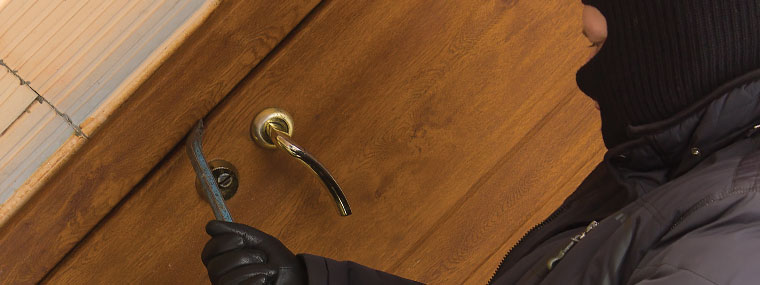
Avoiding Scams and Thieves
By Diane M. Calabrese / Published July 2022

Do not steal. If only everyone took that to heart.
The virtual world compounds opportunities for criminals and multiplies problems for business owners. It has also added a layer of difficulty in detecting potential trouble.
“It is much easier in the real world to spot a dishonest person [through] body language, mannerisms, dialogue, etc.,” says Jim O’Connell, president of Pacific Bay Equipment (formerly Hotsy Pacific) in Modesto, CA. “There’s an air of make believe, or so it seems sometimes, in the virtual world,” he says.
There’s just enough ambiguity about what’s real and what’s not to make it more difficult to assess dishonesty. It’s difficult to discern dishonesty in the real world, too, says O’Connell. “But it seems the real world in our industry has less thievery.”
Checkpoints along the way to sales, just like barriers to entering premises, can catch some culprits before they steal. “We recently had a company supposedly representing a reputable firm with all the right credit info, etc.,” says O’Connell. “It got all the way to funding before our leasing company got suspicious when the buyers were not available to sign documents.”
When the leasing company double checked, it discovered the would-be lessee actually aimed to defraud O’Connell’s company for about $60,000. While the fraudster was stopped short, an investment had already been made.
“We had already purchased the equipment and taken delivery as well, as we were in the process of setting up delivery to the potential customer,” explains O’Connell. The example serves as a vivid reminder of the need for vigilance.
And that’s vigilance in all spheres of interaction. Physical barriers (locks), alarms, lighting, and security cameras deter. O’Connell uses all and recommends their use to protect investments.
“But truth be told, all the countermeasures we use are generally to keep honest people honest,” says O’Connell. “Thieves will get in anywhere they want to. We have had times where our door was left unlocked overnight by accident and had nothing out of the ordinary happen; on the other hand, we have been broken into when all our security measures were in full force.”
Which is the best measure to counter deception? “Your intuition,” says O’Connell. “If it seems too good to be true, it probably is a scam.”
O’Connell trains service department employees to be alert to signals that may indicate a scam. Signals include emails with misspelled words and incorrect grammar, wanting to pay with a credit card and use a freight forwarder, and willingness to pay list price without a second thought.
“Do your due diligence,” says O’Connell. Verify the existence of every company and person. And educate all employees who deal with the customer base on potential signals of an errant party.
“If you won’t lend them your money, do not lend them mine” is a reminder O’Connell issues to employees. And he reminds colleagues that “cash on delivery (COD) is still a good policy.”
Know The Customer
Most customers who visit a distributor to look at equipment have a purchase in mind, and soon. But not always.
“Someone posing as a renter or buyer for equipment often comes in wanting to rent equipment before they purchase it…” says Roy G. Chappell, CEO of Chappell Supply and Equipment in Oklahoma City, OK. They want to know how well it performs before buying.
But they are not prospective buyers. “While looking at the equipment, they are sizing you up to see if you’re lax in getting information before you rent or sell,” explains Chappell.
“The best way to avoid these scams is to have cameras around the showroom that take high-resolution pictures, so you have very good pictures of the individuals,” says Chappell. Be sure to also make copies of the customer’s driver’s license, credit card, and another form of identification; and record the license plate number, make, model, and color of the individual’s vehicle.
Chappell adds that if a looker says he or she represents a company, check out the company. If it’s legitimate, call the company to be sure the person is authorized to make purchases.
There are as many forms of thievery as there are nefarious actors. Chappell warns of virtual world thieves who send an email query asking whether a distributor has something comparable to ‘x.’ If so, when can it be ready? The inquirer will send a truck to pick it up.
“That’s a big red flag,” says Chappell about such a query. “They will want to pay with a credit card. Call the credit card company and see who it is issued to. Will that amount clear?”
There’s another scam that happens three or four times each year, says Chappell. It’s a request for 20 to 30 of the same part, which costs $200 to $500 each, and the promise to send a truck to collect the lot.
Onto the scheme, Chappell tried to warn another company what was going on when the other company called to order parts from him to sell to the scammer. The company did not heed the warning, bought the parts from Chappell, and then sold the parts and got stuck with a credit purchase rejected two days later.
Scammers and thieves are serious. Consequently, thwarting them requires consistent and serious measures.
“We have oilfield pipe fence around our yard,” says Chappell. Two years ago, over a long weekend, thieves broke in using a cutting torch and stole trailer-mounted units. “Now we have an electric fence—10,000-volt—installed by Amarok. Several companies around us also have it…None of us have had a problem after installing the fence.”
Look Closely
Contractors need not worry about scams, correct? No. Completely wrong.
The most common one for contractors is the request for a quote for house washing or the like with the caveat the owner cannot be home, says Doug Rucker, owner of Clean and Green Solutions in Porter, TX. “Usually they are in the hospital, or more recently they are serving in Ukraine.”
The scammer often asks not only about which credit cards the contractor accepts, but also about the credit card processor, says Rucker. “They eventually want you to charge more than the quote given, and then pay the electrician, painter, plumber, etc., the excess.”
Knowing the scam, Rucker had a little joke on the perpetrator for a time. “I used to play along with them years ago, when it first started, even so much as waiting a day or two, then telling them we cleaned the house and that I felt so bad for them [in their situation] there is no charge…Lately, it’s gotten so old, I just reply ‘no’ when they ask if we are available.”
From Rucker’s vantage, it seems a little tougher to hold criminals at bay in the virtual world. “Just the other day I got an email that appeared to be from the Geek Squad saying it was time to renew my two-year agreement and it would be automatically charged to my debit card.”
The logos and all looked authentic, but they were not. One immediate clue to Rucker: He had had no contact with the Geek Squad. (The scammers play the percentages, as some people they phish will.)
“The best countermeasure is to be alert and spot things that just don’t seem right,” says Rucker. “Spelling, grammar, and even the odd requests for charging more than the estimate and paying someone else are indications something is not right.”
Theft is a problem for contractors, too. “For our properties, we mainly use security cameras,” says Rucker. “On our truck and trailer rigs we make sure any loose, expensive items like surface cleaners are chain-locked.”
Establish Boundaries
“In our 32-year history, I have gotten ripped off one time,” says Roy Pennington, owner of Hi Pressure Cleaning Systems Inc. in Houma, LA. “I got a call requesting rental rates on a 3000-psi cold water machine and surface cleaner from a purchasing agent with a known customer.”
Everything seemed right as rain. The agent gave a purchase order number and sent two men wearing uniform shirts to pick up the unit. When Pennington called the customer a month later about the bill, he discovered he had lost the unit to thieves.
“When I saw uniforms ‘for sale’ at the secondhand store, I realized how they had gotten the customer’s uniforms,” says Pennington. “Since then, we get a photocopy of the pickup person’s driver’s license and/or copy down the license plate of the truck…”
No license, as in don’t-have-it-with me, no equipment, says Pennington. “Common sense” dictates that’s the only way to proceed.
“Common sense, which is not that common anymore, is the best deterrent to getting ripped off,” says Pennington. “How many times have I been asked, ‘Can it ship today, if I give you my credit card?’ from a ‘customer’ who found us online.”
As for the phishers in the virtual world, take the extra bit of time to verify. It’s easy to be distracted by the intensity of each day. Resolve not to be.
Pennington reminds us that moving a cursor over an email address reveals the actual sender (usually a wild series of letters and numbers at a server with an unfamiliar name). “Account on hold” is a favorite of scammers. They use high-profile vendor names and hope a recipient is so flummoxed the recipient will immediately call the number they give to set things right by just giving them a credit card number.
Theft comes in all forms in 2022. A renter who takes out a trailer may fudge on its hours of use.
“On expensive trailer packages [our company] invests $12 a month for GPS tracking,” says Pennington. “[Any] movement of more than five feet” is tracked and the system “sends a message when the unit is started up.” No longer does anyone try to claim the unit was used only two days in a week when it was used for five.
With the tracking, Pennington is helping his customer to maintain boundaries. And boundaries must be set to stay solvent.
Some who are new to business recoil at the idea of being too restrictive with customers, asking for identification, for instance. Or asking for cash.
“My company operates on a strict policy that I saw on the sign at a dry dock,” says Pennington. “The sign says, ‘No cash, no splash’.”
The common denominator is common sense. “The best advice I can offer is to use common sense,” says Penning-ton, echoing O’Connell “If a deal looks too good to be true, it probably is.”
And never let your guard down, explains Pennington. “Remember the second mouse at the trap gets the free cheese.”






